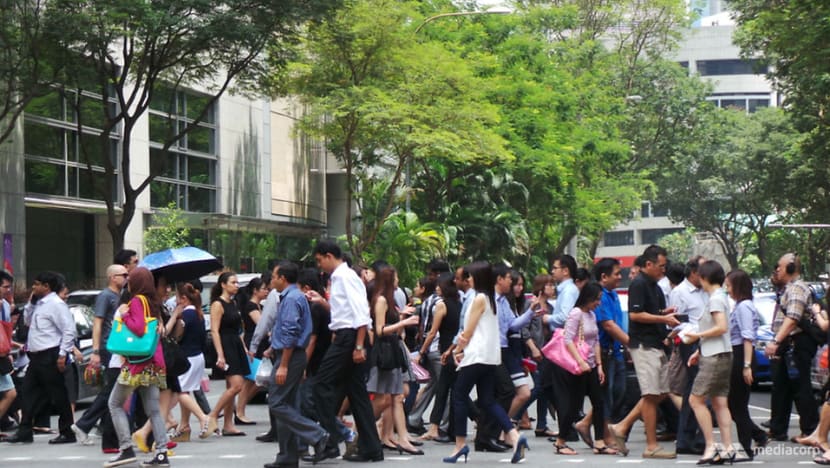Flexible work arrangements increasingly important as more Singaporeans take on caregiving roles: Gan Siow Huang
Guidelines for flexible work arrangements will be implemented later this year.

The COVID-19 pandemic has forced many companies to adopt flexible and remote working arrangements. (Photo: Unsplash/Priscilla Du Preez)

This audio is generated by an AI tool.
SINGAPORE: The upcoming guidelines for flexible work arrangements (FWAs) will become increasingly important as more people in Singapore take on caregiving roles, said Minister of State for Manpower Gan Siow Huang on Tuesday (Feb 20).
The guidelines, which will be implemented later this year, will set norms for employees to request for flexibility, as well as encourage employers to grant these appeals based on business needs. Discussions have been ongoing since September last year.
“Singapore has an ageing population. We know that more and more of us will be caregivers, at some point,” said Ms Gan during a dialogue on the Tripartite Guidelines on Flexible Work Arrangement Requests.
“It is our duty to create an environment that is supportive so that those people who want to work can continue to work, even while they are managing other family duties at home.”
BALANCING WORK AND CAREGIVING COMMITMENTS
A workgroup, which includes representatives from the government, National Trades Union Congress (NTUC), Singapore National Employers Federation (SNEF) and various professional bodies, was formed last year to develop guidelines to facilitate the implementation of FWAs.
These best practices will spur businesses to consider a wide range of requests, including staggered hours or part-time work, and may also include examples of reasonable and unreasonable grounds to reject requests.
“We do think that for flexible work arrangements, a large group who would benefit from this would be caregivers,” said NTUC assistant secretary-general Yeo Wan Ling.
“But we also know at the same time that being flexible at work (and) having different types of work arrangements is something that a lot of younger workers are also looking forward to.
“They could be looking at studying at the same time as working. And because of this, we do think that flexible work arrangements will also benefit non-caregivers.”
At the dialogue, SNEF and several employee unions agreed that all jobs could include some latitude.
Chye Thiam Maintenance CEO Edy Tan said: “I think sometimes we might even have to give people the benefit of doubt, at a certain point of time, because if you want to be very rigid, I don't think you would be able to actually attract or retain staff.”
WORKING FROM HOME, COMPRESSED WORK WEEK
Under the guidelines, employees will be empowered to ask for flexibility through formal requests.
“So these guidelines will really encourage employers to see employees as fathers, as mothers, as sons and also as daughters,” said Dr Xander Ong, CEO at Centre for Fathering.
“Once we're able to encourage everyone to see our colleagues also as such, we'll be able to really build Singapore to be one that is made for families.”
One arrangement familiar to many people is teleworking, where people can work from the office a few days a week. In Singapore, this is commonly known as “work from home”.
This arrangement has gained prominence around the world during the COVID-19 pandemic.
A survey by job search platform Indeed in June last year, which polled 607 employers and 1,223 employees, revealed that nearly half of employers in Singapore allow for some form of hybrid arrangement.
But FWAs can also include a compressed work week, which some countries have embraced. Under this, the standard 40 hour five-day work week can be compressed into four days.
Belgium became the first European country to legislate this for workers who want to do so in 2022. All government employees in the United Arab Emirates can also legally choose to take on such an arrangement from July 2023.
There are also countries allowing flexible working hours, such as Finland, which first passed the Working Hours Act in 1996, giving staff the right to start and finish three hours earlier or later than their usual time.

CHALLENGES OF HAVING FLEXIBLE WORK
To implement flexible arrangements, it is important to build up a culture of trust within a company itself, said Ms Yeo, who is also director of the NTUC's small and medium-sized enterprise arm U SME and its women and family unit.
“It is ensuring that when it comes to consideration of the flexible work arrangement requests, companies actually have a fair way of assessing this, with various types of workers, whether or not they are caregivers, whether or not they are people who actually just want flexible time,” she told CNA’s Singapore Tonight on Tuesday.
“The next thing is actually to ensure that there's proper performance appraisal systems that are set up for our workers when it comes to them looking at flexible work.”
Dr Brandon Koh, lecturer for the human resource management programme at the Singapore University of Social Sciences, said: “I think for flexible work arrangements to succeed, it is very important to tailor them to individual needs and analyse what they are first.”
Dr Koh told CNA that if supervisors are generally supportive, suitable work arrangements “can be discussed and implemented pretty much on an individual level”.
“I would like to emphasise that equitable performance standards and fair appraisals would be the non-negotiable factor,” he added.
“I think a flexible work arrangement can be generally accommodating, but the evaluation standards are the ones that have to be consistent and rigid.”




















